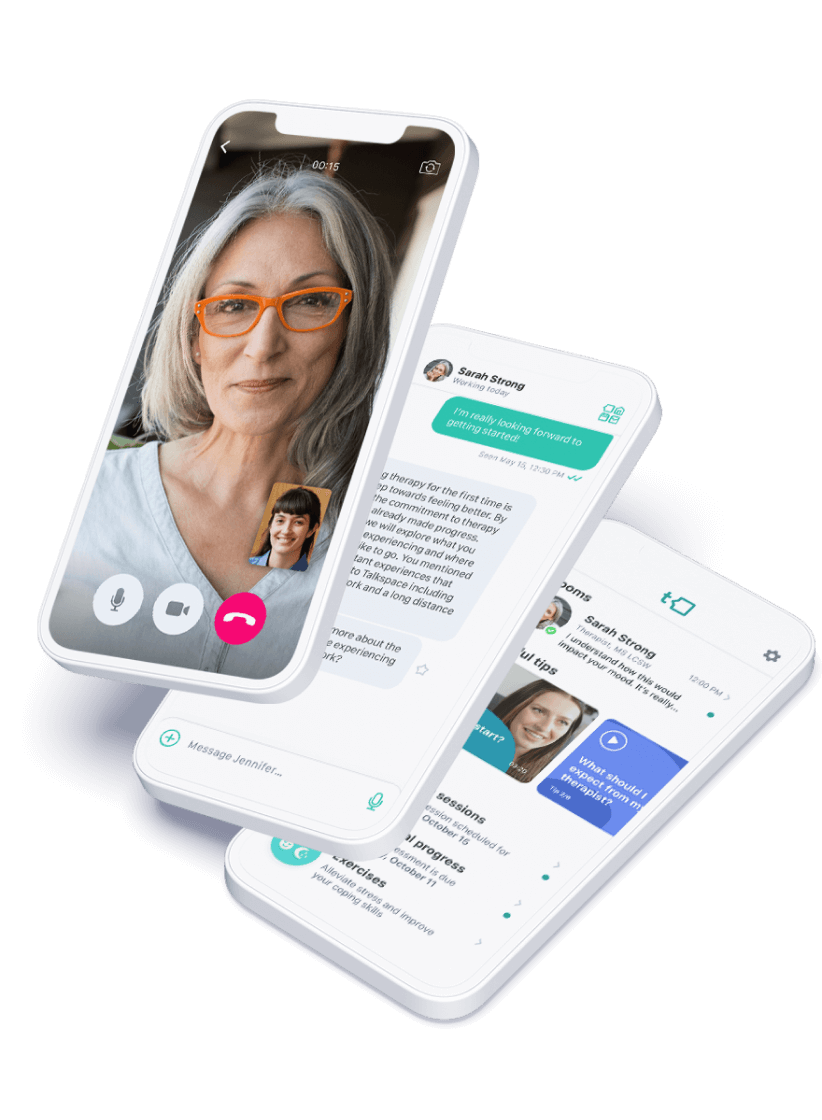Updated On: May 3, 2024
Overview
While depression is a common mental health condition that can begin at any age in life, it’s most commonly diagnosed in early adulthood. Because depression affects the brain, some medication for depression has proven beneficial for treatment. The American Psychiatric Association (APA) estimates that anywhere from 80% – 90% of people who seek treatment for their depression see positive results.
Antidepressant medication is often the first line of treatment for depression medications. However, there are options for other types of medication and holistic or therapeutic treatments for depression, too.
Depression can have a major impact on your life, and while depression medication isn’t necessarily a cure, it might help reduce or relieve some of the symptoms you may be experiencing. Major symptoms of depression can include:
- Irritability
- Feelings of hopelessness
- Insomnia
- Sleeping excessively
- Weight gain or loss
- Having a short temper or reacting quickly
- Persistent and often uncontrollable thoughts about bad things happening
- An inability or lack of motivation to take care of yourself
- Feeling unable to carry out your daily responsibilities
- Psychotic symptoms in extreme cases — including hallucinations or delusions
- Thoughts of death, self harm, or suicidal thoughts
When symptoms of depression last for multiple weeks or begin to have a significant impact on how you function, you may be experiencing what’s known as severe depression.
If you’re looking for the best medication for depression, you should learn more about your options. There are several types of depression medications that are often prescribed by an in-person or online psychiatrist. The first steps are getting a right diagnosis and knowing how you can get medication for depression and whether or not you should consider it in the first place. Keep reading to learn more.
Types of Medications Used to Treat Depression
There are a number of depression meds that may help treat your condition. It’s important to understand how they work and in what ways they can help before you begin taking any antidepression medications.
SSRIs
Selective serotonin reuptake inhibitors (SSRIs) are a class of antidepressants often prescribed to treat depression. In fact, they’re the most commonly prescribed form of antidepressant medication used to treat depression.
SSRIs work by lowering serotonin reuptake in your brain. Serotonin imbalance is thought to likely play a role in depression, so reducing the uptake allows the serotonin to work more effectively in the brain.
Popular SSRIs to treat mild or severe depression include:
- Celexa (citalopram)
- Lexapro (escitalopram)
- Luvox (fluvoxamine)
- Paxil/Pexeva/Brisdelle (paroxetine)
- Prozac/Sarafem (fluoxetine)
- Zoloft (sertraline)
Possible side effects of SSRIs to treat severe or mild depression:
- Agitation
- Feeling shaky or anxious
- Indigestion
- Diarrhea or constipation
- Blurred vision
- Loss of appetite
- Weight loss
- Dizziness
- Sexual Side Effects
SNRIs
Serotonin and norepinephrine reuptake inhibitors (SNRIs) improve norepinephrine and serotonin levels in the brain, which can reduce symptoms of depression. SNRIs differ from SSRIs because they work on increasing low levels of norepinephrine and serotonin — SSRIs only work on serotonin levels.
Popular SNRIs to treat depression include:
- Cymbalta (duloxetine)
- Effexor XR (venlafaxine)
- Fetzima (levomilnacipran)
- Pristiq, Khedezla (desvenlafaxine)
Possible side effects of SNRIs to treat depression:
- Dry mouth
- Nausea
- Headache
- Dizziness
- Excessive sweating
TCAs
Tricyclic antidepressants (TCAs) are an older generation of medication for depression. It’s not fully understood how TCAs work to improve depression. It’s thought that they’re effective because they block the action of the neurotransmitter acetylcholine while increasing levels of two other neurotransmitters, serotonin and norepinephrine, ultimately restoring balance in the brain and reducing symptoms of depression.
Popular TCAs to treat depression include:
- Amitriptyline
- Amoxapine
- Anafranil (clomipramine)
- Doxepin
- Norpramin (desipramine)
- Pamelor (nortriptyline)
- Protriptyline
- Surmontil (trimipramine)
- Tofranil (imipramine)
Possible side effects of TCAs to treat depression:
- Slightly blurred vision
- Dry mouth
- Constipation
- Dizziness
- Drowsiness
- Weight gain
- Difficulty urinating
- Excessive sweating (particularly at night)
Dopamine reuptake blocker
Another medication for depression is a Norepinephrine- dopamine reuptake Inhibitor. It works by blocking the presynaptic uptake of noradrenaline (NA) and dopamine (DA). One benefit to this drug is some of the negative side effects (like weight gain and reduced sex drive) that are common to other antidepressants don’t seem to be a factor with dopamine reuptake blockers.
There is only 1 dopamine Norepinephrine reuptake blocker on the market to treat depression:
- Aplenzin, Wellbutrin (bupropion)
Possible side effects of dopamine reuptake blockers to treat depression:
- Nausea
- Insomnia
- Weight loss
- Headache
- Constipation
- Anxiety
Tetracyclic antidepressant
Tetracyclic antidepressants can be prescribed to treat both depression as well as anxiety. Tetracyclic antidepressants work to ease depression symptoms by balancing out neurotransmitters.
There is only 1 tetracyclic antidepressant on the market to treat depression:
- Ludiomil (Maprotiline)
Possible side effects of Maprotiline to treat depression:
- Drowsiness
- Nausea
- Nightmares
- Weakness
- Tiredness
- Sensitivity to sunlight
- Dry mouth
- Constipation
- Change in appetite
- Weight change
5-HT1A receptor antagonist
An 5-HT1A receptor antagonist can balance neurotransmitters and serotonin levels in the brain, which can effectively treat depression. Note that 5-HT1A receptor antagonists typically aren’t a first-line treatment option for depression. Most often, other types of medication will be tried before an 5-HT1A receptor antagonist is offered.
There is only 1 5-HT1A receptor antagonist on the market to treat depression:
- Viibryd (vilazodone)
Possible side effects of Viibryd to treat depression:
- Nausea
- Vomiting
- Difficulty sleeping
5-HT2 receptor antagonists
5-HT2 receptor antagonists are older drugs used to treat depression. They work by altering the chemicals in your brain to reduce symptoms of depression.
Popular 5-HT2 receptor antagonists to treat depression include:
- Nefazodone
- Oleptro (trazodone)
Possible side effects of 5-HT2 receptor antagonists to treat depression:
- Hypotension
- Dizziness
- Headache
- Fatigue
5-HT3 receptor antagonist
The 5-HT3 receptor antagonist can treat depression as well. It increases the release of several different neurotransmitters (serotonin, norepinephrine, dopamine, glutamate, acetylcholine, and histamine) and reduces the release of GABA through 3 different modes of action
There is only 1 5-HT3 receptor antagonist on the market to treat depression:
- Brintellix (vortioxetine)
Possible side effects of 5-HT3 receptor antagonists to treat depression:
- Muscle tension
- Headache
- Mood swings
- Dizziness
- Sudden angry outbursts
- Runny nose
MAOIs
Monoamine oxidase inhibitors (MAOIs) are another older drug that is sometimes prescribed to treat depression. MAOIs work by hindering the breakdown of dopamine, norepinephrine, and serotonin. A caveat to MAOIs is they often interact with other drugs (both prescription and over the counter) and they may interact with some foods, as well.
Popular MAOIs to treat depression include:
- Emsam (selegiline)
- Marplan (isocarboxazid)
- Nardil (phenelzine)
- Parnate (tranylcypromine)
Possible side effects of MAOIs to treat depression:
- Nausea
- Dry mouth
- Diarrhea or constipation
- Drowsiness
- Headache
- Insomnia
- Dizziness
- Lightheadedness
Noradrenergic antagonist
Primarily used for depression treatment, noradrenergic antagonists can alter various chemicals in the brain, alleviating some common depression symptoms.
There is only 1 noradrenergic antagonist on the market to treat depression:
- Remeron (mirtazapine)
Possible side effects of Remeron to treat depression:
- Sedation
- Hallucinations
- Agitation
- Fever
- Rapid/uneven heart rate
- Loss of coordination
- Stiff muscles
- Confusion
- Feeling unsteady
- Tremors
- Flu-like symptoms
Medications Commonly Prescribed for Depression
Because depression significantly impacts the brain, drugs that work in your brain are likely the most helpful. The following depression medication list shares some of the more commonly prescribed medications for depression.
| Name Brand | Generic | Description |
| Lexapro | Escitalopram | An SSRI used to restore balance of serotonin in the brain. Can improve energy level and feelings of well-being to help with symptoms of depression. |
| Celexa | Citalopram | SSRI that can improve energy levels and feelings of well-being to alleviate symptoms of depression. |
| Zoloft | Sertraline | Another SSRI that treats a variety of mood disorders. Helps with depression by restoring the balance of serotonin in the brain. |
| Paxil | Paroxetine | SSRI that restores serotonin levels in the brain to treat depression and other anxiety disorders. Can be used alone or with other medications. |
| Prozac | Fluoxetine | An antidepressant of the selective serotonin reuptake inhibitor (SSRI) class that’s used to treat depression. |
| Cymbalta | Duloxetine | An antidepressant that can treat depression and also treats nerve pain. |
| Effexor | Venlafaxine | Antidepressant and nerve pain medication that is effective on depression and other anxiety disorders. |
| Wellbutrin | Bupropion | Works in the brain and is used to treat depression; also a smoking cessation treatment. |
| Desyrel, Desyrel Dividose, Oleptro, and Trazodone D | Trazodone | Antidepressant and sedative. |
| Remeron | Mirtazapine | Antidepressant used to treat symptoms of depression. It’s not fully understood how Remeron works. |
| Pristiq | Desvenlafaxine | Treats major depressive disorder in adults. |
| Abilify | Aripiprazole | Antipsychotic medication that treats depression and a host of other conditions like: schizophrenia, bipolar disorder, and Tourette syndrome. |
| Seroquel | Quetiapine | Another antipsychotic that treats depression as well as schizophrenia and bipolar disorder. |
| Zyprexa | Olanzapine | Antipsychotic medication that works by helping to restore the balance of natural substances in the brain. |
| Lithium | – | Mood stabilizer that can be used to treat mood disorders like depression. |
| Lamictal | Lamotrigine | Prescribed for maintenance treatment of bipolar I disorder; these are more effective against depressive episodes than mania. |
Talk to your psychiatrist or healthcare professional about the possible risks and benefits associated with the above medications before starting treatment.
How to Get Depression Medication
Considering depression medication? You should talk to your doctor sooner than later. With their help, you can come up with the most effective course of treatment so you can learn to manage your depression.
In order to get medication for depression, the following steps should be taken:
- Get a diagnosis
To be diagnosed, you’ll need a psychological and physical evaluation as well as lab tests. A mental health professional will likely use American Psychiatric Association’s (APA’s) criteria for depression listed in the Diagnostic and Statistical Manual of Mental Disorders (DSM-5). - Begin therapy or treatment
Therapy can help you manage depression. - Consider medication
Medication can be prescribed in addition to treat your depression. - Talk to your prescriber
A psychiatrist can help prescribe you the right medication for depression.
Should You Treat Depression with Medication?
Deciding to treat your depression with medication is a very personal decision but a lot times it is needed to prevent the worsening of the symptoms and prevent complications. Anytime you choose to take medication for a mental health condition, or for any health condition for that matter, it’s important that you understand as much as possible about what you’ll be taking.
Your doctor or psychiatrist can fully discuss your treatment options and go over everything you need to know about any depression medication you’re considering.
It’s important to keep in mind that the earlier you treat your depression, the more effective treatment tends to be. Equally important is understanding that there is no shame in taking medication for your depression. The Center for Disease Control and Prevention (CDC) reports that more than 13% of Americans took an antidepressant within a 30-day time period between 2015-2018. That number continues to grow, which means you’re not alone in dealing with your depression.
When you talk to a prescriber or psychiatrist, you can ask any of the following.
Questions to ask a prescriber:
- Should I consider depression medication?
Your prescriber can help you weigh the pros and cons of any depression medication that you may be considering. - What are possible side effects of this medication?
It’s always important to understand potential side effects of any medication. This can help you make the best decision for you and your condition and determine whether or not a medication is right for you. - What other treatments should I be considering for my depression?
Medication isn’t your only option for treating depression. You can choose to combine depression meds with other treatments as well. Self-help techniques, therapy, and more can all be potentially helpful in treating depression. - Should I consider treatment in conjunction with depression medication?
Any time you make the decision to begin medication for a health condition, it’s smart to look at what else you can do. For example, maybe you want to think about trying online therapy in addition to your medication. A psychiatrist can help you decide. - Are there any holistic or self-help techniques I can try?
There are a number of self-help techniques and holistic tactics that you can implement to help manage depression. Things like journal writing, meditation, eating right, getting enough exercise and sleep might all help depression. - Should I consider therapy in addition to medication?
Certain forms of talk therapy — like cognitive behavioral therapy techniques — have proven effective in treating depression. - Are there any other conditions going on that could be contributing to my depression?
Depression is related to multiple other mental and physical conditions. If not dealt with, it can either lead to or worsen existing conditions like depression, substance abuse, insomnia, digestive problems, and other physical health issues like headaches, bowel problems, or migraines.
If you’re ready to start treating your mental health condition with depression medicine, connect with a prescriber at Talkspace.
See References
-
Antidepressant Use Among Adults: United States, 2015-2018
Torres, M.D., MBA, DFAPA F. Products - Data Briefs - Number 377 - September 2020. Cdc.gov. Published 2020. Accessed October 13, 2021.
-
Dopamine Reuptake Inhibitors
ScienceDirect. Accessed October 13, 2021.
-
American Psychological Association (APA)
Accessed October 17, 2021.
-
Antidepressant use among adults: United States, 2015–2018
Brody DJ, Gu Q. NCHS Data Brief, no 377. Hyattsville, MD: National Center for Health Statistics. 2020. Accessed October 13, 2021.

Dr. Muhammad Munir, MD, DFAPA, has over 20 years of clinical experience specializing in mood disorders, anxiety disorders, bipolar disorder, PTSD, panic disorder, and ADHD. Dr. Munir believes in “back to basics” the therapeutic alliance between the physician and patients. The hallmark of this alliance is the emphatic process whereby the patient is not only enabled, but educated and encouraged, to take an active role in their psychiatric care and wellbeing.
Articles about Depression: Symptoms, Causes & Treatment
View all articles
What to Do if Your Teenager is Making You Feel Depressed

Post-Weaning Depression: Recognize the Signs & Find Support

How to Think Positive When Depressed: Techniques for a Brighter Outlook

Have You Fallen Out of Love, or Are You Depressed?

How to Prevent Postpartum Depression

How to Explain Depression to Someone

Are There Stages of Depression?

Can Adderall Cause Depression?

Can Depression Cause Memory Loss?

14 Effective Coping Skills for Depression


